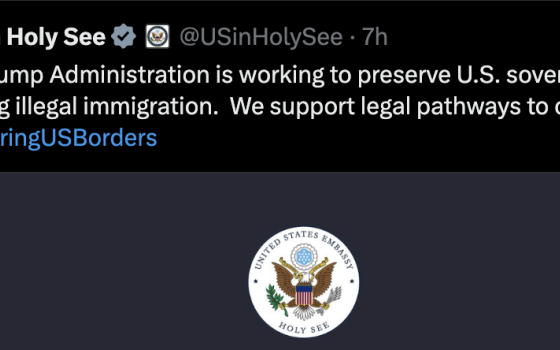
(Unsplash/Amauri Mejía)
Is it possible to manufacture art? Is there a way to take something that has always been a mystery, boil it down into a formula consisting of zeros and ones and make the creative process more streamlined? Can we boost profits in the creative sphere without compromising our moral obligation to support and encourage those humans who find their vocation in places where technology is creeping in?
Questions such as these surrounding the topic of artificial intelligence have been at the forefront of media conversations lately, and it is worth a deeper look.
Over the summer, striking members of the Writers Guild of America (WGA) and the Screen Actors Guild and American Federation of Television and Radio Artists (SAG-AFTRA) took to picket lines over a labor dispute with the Alliance of Motion Picture and Television Producers, the bargaining representative for Hollywood's major studios. Among the terms WGA and SAG-AFTRA were negotiating was the regulation of artificial intelligence in the writer's room, as well as on screen.
Then, in September, the Authors Guild filed a headline-making lawsuit in district court against OpenAI, the company behind ChatGPT, a well-known consumer-facing chat bot.
The Author's Guild, the country's oldest and largest professional writers' organization, works to support its members' rights to earn a fair wage from their work. In a lawsuit signed by more than 15,000 members, the guild stated that, in training databases to provide high-quality responses to questions and prompts, OpenAI blatantly violates copyright laws, using material from authors like John Grisham, George R.R. Martin and Jodi Picoult — among thousands of others — without compensation.
OpenAI has admitted to this practice, calling it a copyright issue, knowing that the better the source material, the better the output.
The majority of the guild are not making Grisham-level paychecks. A study done by the Authors Guild found the median average salary of a full-time author to be around $20,000 a year, with 50% of that coming from book sales. The remaining half of their income derives from content writing, the very space into which OpenAI is creeping.
One unnamed member stated he had lost 75% of his marketing and web content work to clients switching to AI. Goldman-Sachs predicted that, in the near future, generative AI could replace as many as 300 million full-time jobs, or one quarter of labor performed in this arena.

(Unsplash/Yannick Pulver)
Beyond the legal implications, the use of AI in art is becoming a moral issue. Are we putting profit over art?
As people of faith, we must ask: What kind of God-given rights are afforded to artists, and how would the shift toward AI undermine the concept of art as a gift meant to better this world and glorify God?
This conversation is about more than consumerism, or simply giving credit where credit is due. The issue is about how we value art — and, more so, whether we value the artists themselves.
One of the pillars of Catholic social teaching is the dignity of work and the rights of workers. The U.S. Conference of Catholic Bishops states, "Work is more than a way to make a living; it is a form of continuing participation in God's creation."
The opening lines of the Bible in Genesis portray God as Creator, and humans in the image and likeness of that Creator. Many individuals who devote their lives to art — whether the written word, visual media, music, performance, et cetera — see their work as divinely inspired. Many would say theirs is not a job so much as a vocation, a calling, a way to express the truest essence of themselves.
In Evangelii Gaudium, Pope Francis wrote, "The economy can no longer turn to remedies that are a new poison, such as attempting to increase profits by reducing the work force and thereby adding to the ranks of the excluded."
Pope John Paul II, in his 'Letter to Artists,' spoke of the 'breath' of the Creator Spirit that has been a part of creation since the very beginning, flowing in and through artists for millennia.
Certainly, artists who are pushed out of work due to a heavy reliance on technology are capable of finding other means of employment. But for many artists, this is more than a job; this is work that they take pride in, find dignity in, work that allows them to provide for themselves and their families with joy. Businesses have long eliminated jobs to save money, but by relying on artificial intelligence, we risk increasing poverty in a community that often puts passion over profit.
Pope John Paul II, in his "Letter to Artists," spoke of the "breath" of the Creator Spirit that has been a part of creation since the very beginning, flowing in and through artists for millennia and furthering the richness of the end result. If we as Catholics believe that talent is a gift from God, then are we not sucking the very divine breath out of creativity when we choose a computer over a living, breathing artist?
Artificial intelligence might have its place; some artists use AI as a springboard or storyboard on their way to creating the final product. But when it comes to art, the human experience has to be a filter through which inspiration flows. Otherwise, it is simply a formula, an output.
By relying on artificial intelligence as a shortcut instead of investing in humans who have lived experience, we risk prioritizing profit over the dignity and fair pay of people who see this work as a divine calling.
Perhaps this is the key to embracing the technology of the future while holding on to the talent of the past. AI might be able to help us brainstorm, or see things in a broader perspective, but the lived experience of a talented artist is the only way to find meaning in the artistic expression. There is just no shortcut to divine inspiration.





